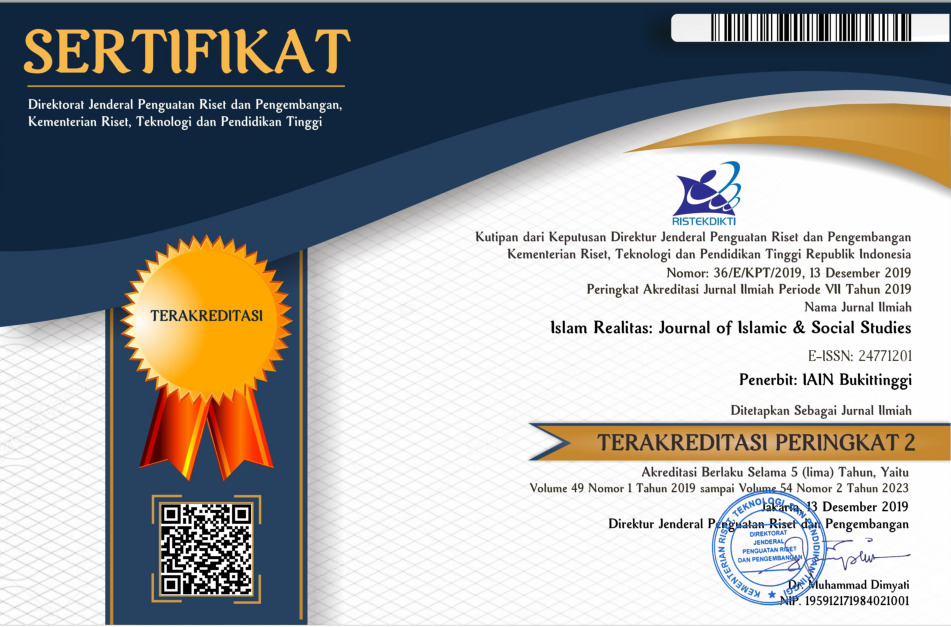KONSISTENSI BMT AGAM MADANI DALAM MENERAPKAN PRINSIP-PRINSIP EKONOMI SYARI’AH
Keywords:
BMT, Sharia, Islamic EconomicsAbstract
References
Abdoerraoef, 1970. Al-Qur’an dan Ilmu Hukum: A Comparative Study, Djakarta:
Bulan Bintang
Agustianto, Tonggak Kebangkitan EkonomiSyari’ah, http://ekisonline .com/index.
php? option = com _content&task=view&id=45&Itemid=28
Antonio, Muhammad Syafi’i, 2001 Bank Syari’ah, Dari Teori ke Praktik, Jakarta:
Gema Insani
Ash Shiddiqiy, Teungku Muhammad Hasbi, 1997. Pengantar Fiqh Mu’amalah,
cet 1, ed.2, Semarang: Pustaka Rizki Putra
Baihaqi Abd. Madjid (Ed), 2000. Paradigma Baru Ekonomi Kerakyatan Sistim
Syariah: Perjalanan Gagasan dan Gerakan BMT, Jakarta: PINBUK
Basyir, Ahmad Azhar, 2000 Asas asas Hukum Mu’amalat (Hukum Perdata Islam),
ed Revisi, Yogyakarta: UII Press
Dahlan, Abdul Azis, ed. 1996. Ensiklopedi Hukum Islam, jilid 5, Jakarta: Ichtiar
Baru van Hoeve
Departemen Pendidikan Nasional, 2002 Kamus Besar Bahasa Indonesia, Jakarta:
Balai Pustaka
Ghufron A. Mas’adi, 2002 Fiqh Muamallah Konstekstual, Cet. 1. Jakarta: Raja
Grafindo Persada
Muhammad, 2000. Lembaga-lembaga Keuangan Umat Kontemporer, cet. I,
Yogyakarta: UII Press
PINBUK, tt Modul Pelatihan Pengelola Baitut Tamwil. Jakarta: PINBUK
PINBUK, tt Pedoman Cara Pembentukan BMT, Jakarta: PT. Bina Usaha Indonesia
Ridwan, Muhammad, 2003 Manajemen Baitul-Mal wa Tamwil (BMT), YogyaÂ
karta: UII Press
Subekti, 1992 Hukum Perjanjian, cet 14, Jakarta: Intermasa
Sudarsono, Heri, 2004 Bank dan Lembaga Keuangan Syariah Deskripsi dan
Ilustrasi, Cet. 2, Yogyakarta: Ekonisia
Tim Penyusun. 2004. Pedoman BMT Jaringan Muamalat Center Indonesia,
Yog yakarta
Ya’kub, Hamzah, 1984. Kode Etik Dagang Menurut Islam Pola Pembinaan Hidup
dalam Berekonomi, Bandung: CV. Diponegoro
Downloads
Published
How to Cite
Issue
Section
Citation Check
License
Authors who publish with this journal agree to the following terms:
- Authors retain copyright and grant the journal right of first publication with the work simultaneously licensed under a Creative Commons Attribution License that allows others to share the work with an acknowledgment of the work's authorship and initial publication in this journal.
- Authors are able to enter into separate, additional contractual arrangements for the non-exclusive distribution of the journal's published version of the work (e.g., post it to an institutional repository or publish it in a book), with an acknowledgment of its initial publication in this journal.
- Authors are permitted and encouraged to post their work online (e.g., in institutional repositories or on their website) prior to and during the submission process, as it can lead to productive exchanges, as well as earlier and greater citation of published work (See The Effect of Open Access).




